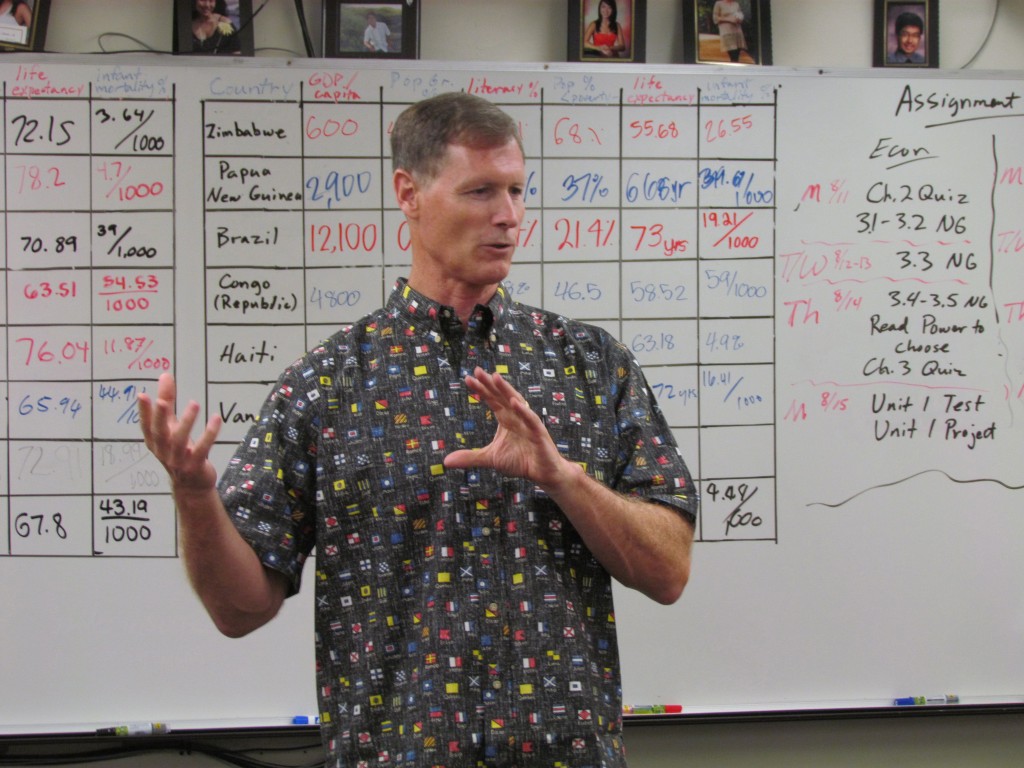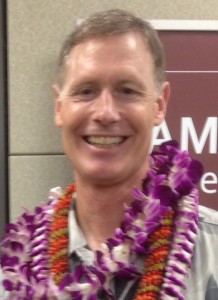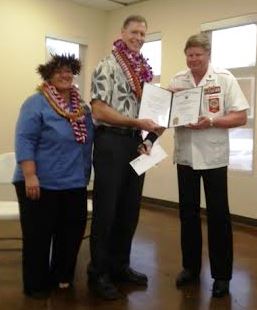Our Spotlight series continues this week, where we talk with teachers who are making a difference in the field of economic education.
In today’s installment, we’re talking with Stan Herder, who teaches economics, government, and history at Hawaii Baptist Academy in sunny Honolulu, Hawaii.
Stan didn’t mention it in his responses below, but we’ll brag for him: He was awarded the 2013-2014 Smart/Maher VFW National Citizenship Education Teacher Award, which is offered by the Hawaii Veterans of Foreign Wars. The award recognized educators who are active in citizenship education, including topics such as government and economies.
 Stan teaches economics (12th grade), government (9th grade), ancient world history (9th grade), and Hawaiian history (10th – 12th grade).
Stan teaches economics (12th grade), government (9th grade), ancient world history (9th grade), and Hawaiian history (10th – 12th grade).
Here is what he had to say:
How long have you been teaching economics? What do you love most about it?
I first taught economics for six years when I was a beginning teacher. As I had majored in history and had a minimal number of college courses in economics, I struggled both understanding many economic concepts and teaching the subject in an interesting way. Seeing this as a major challenge, I began taking university level courses and attending as many economic conferences and in-service opportunities in as I could. By my fifth year I was named Hawaii Economics Teacher of the Year. Not only had I learned a lot more about the economy and how it works, I came to love economics.
For various department personnel reasons and the fact that I went into administrative work for ten years, I did not teach economics for again until the fall of 2007. I am now in my seventh year of teaching economics my second time around.
I love economics because it is the real world. It helps us understand people and human interactions. It goes hand-in-hand with my other love – history. Economics helps to make history much more understandable.
Students also see the practical aspects of economics. I always include a substantial amount of class time on personal finance. Personal financial knowledge and skills are necessary life skills that students can appreciate and enjoy.
What are your biggest challenges in teaching economics?
While some changes in the economy and in markets are easily explainable, many are not. The economy, especially on a global scale, is very complex. There is always much to learn.
While I find most of my students receptive, there are always a number of students who either find economics a difficult subject to understand or for one reason or another are not open to or care for the subject. I face the common teacher challenge of always making the subject both relevant and enjoyable.
(Interview continues below the picture)
You’re currently serving on the SF Fed Educational Advisory Group (EAG). How has the experience changed your teaching and/or your professional development?
Being on the EAG has opened up a new world of resources. I am much more aware of the many valuable tools of the SF Federal Reserve and many related websites, many which have already well-thought out lessons or that are easily adaptable.
Just as important are the professional educators with whom we are in regular contact. With each subject we discuss, I am always amazed by the insights and variety of views, all of which broaden my views and perspective, and often how I teach a subject.
What economics education project or topic are you working on that excites you? Why?
Our school requires service learning and has added this requirement as part of the economics course. I am working on making the service learning a project related to the students’ study of economics. My idea is to have students, working individually or in groups, identify a community problem or need. Through research, interviews, and working in an area related to the problem or need, they will then analyze the situation. Students will write up their findings and write a public policy suggesting economic thinking as ways to improve or solve the situation. The student(s) will give a PowerPoint presentation to school and at least one community leader.
I want students to work in areas of their interest and with the number of students I teach there will need to be a substantial number of projects. I would love to have students truly understand the issues behind community problems and play a role in improving our community and people’s lives.
What has been a recent impactful experience that involves your students and economics education?
Let me mention two. One student, who wants to work with the economically disadvantaged, was struck by data that related lifestyles to education levels and economic decisions. He has decided to major in economics in college in the hopes of using economic solutions to improve lives.
A second experience is that I have my students participate in the Hawaii Stock Market Simulation each year. In one semester last year, two student groups came in first and second in the state in one of the divisions. Two of the students in these groups gained enough interest in the market to research funds and begin investing.
(Interview continues below the picture)
 What advice would you give you teachers (of any subject) who would like to insert more economics into their lessons but aren’t sure where to start?
What advice would you give you teachers (of any subject) who would like to insert more economics into their lessons but aren’t sure where to start?
I have two themes in my classes: Economics is everywhere and All decisions have costs. I encourage teachers to look around and identify some areas that students are familiar with and start there.
Mathematics can easily relate real world decision making, including using real statistics to teach graphing, percentages and mathematical computations. Social studies needs to relate economic thinking as an important part of cause and effect. Start small with one economic lesson and expand as you feel more comfortable and confident.
Thank you, Stan, for talking with us!
And in case you missed it, check out previous posts in the series:
Cheryl Shea of Pinnacle High School (Phoenix, AZ)

